Abstract
STUDY OBJECTIVE--This study aimed to describe the relationship between health and socioeconomic indicators in the 38 neighbourhoods of the city of Barcelona, Spain. DESIGN--Mortality data for 1983-89 and socioeconomic data for each of the 38 neighbourhoods of Barcelona were used. Mortality indicators used were the comparative mortality figure, the ratio of potential years of life lost, and life expectancy at birth. Socioeconomic indicators were the percentage of unemployed, the percentage of illiteracy, monthly telephone usage, the average power and age of cars, and the average rateable value of buildings and of land. The statistical correlation between socioeconomic indicators and mortality indicators was studied by Spearman's rank correlation coefficient. SETTING--The 38 neighbourhoods of Barcelona, Spain. MEASUREMENTS AND MAIN RESULTS--The comparative mortality figure ranged from 87.41-152.43 and the ratio of potential years of life lost from 74.94-237.31 in both sexes. Both the absolute difference and the ratio of the value for the neighbourhood with lowest mortality and that with highest mortality were larger when premature mortality was examined. Life expectancy at birth ranged from 64.77-75.32 years in men and 75.04-81.51 in women. All correlations between mortality and socioeconomic indicators were high and statistically significant: the higher the unemployment and illiteracy levels and the older the cars, the greater the comparative mortality figure and ratio of potential years of life lost, and the lower the life expectancy (negative correlations). Conversely, the higher the telephone use, the more powerful the cars, and the greater the rateable value, the lower the mortality (negative correlations) and the greater the life expectancy. These correlations were greater in males than in females. The highest correlations were with illiteracy. CONCLUSIONS--This study has detected significant differences in mortality in a large town in the Mediterranean region of Europe.
Full text
PDF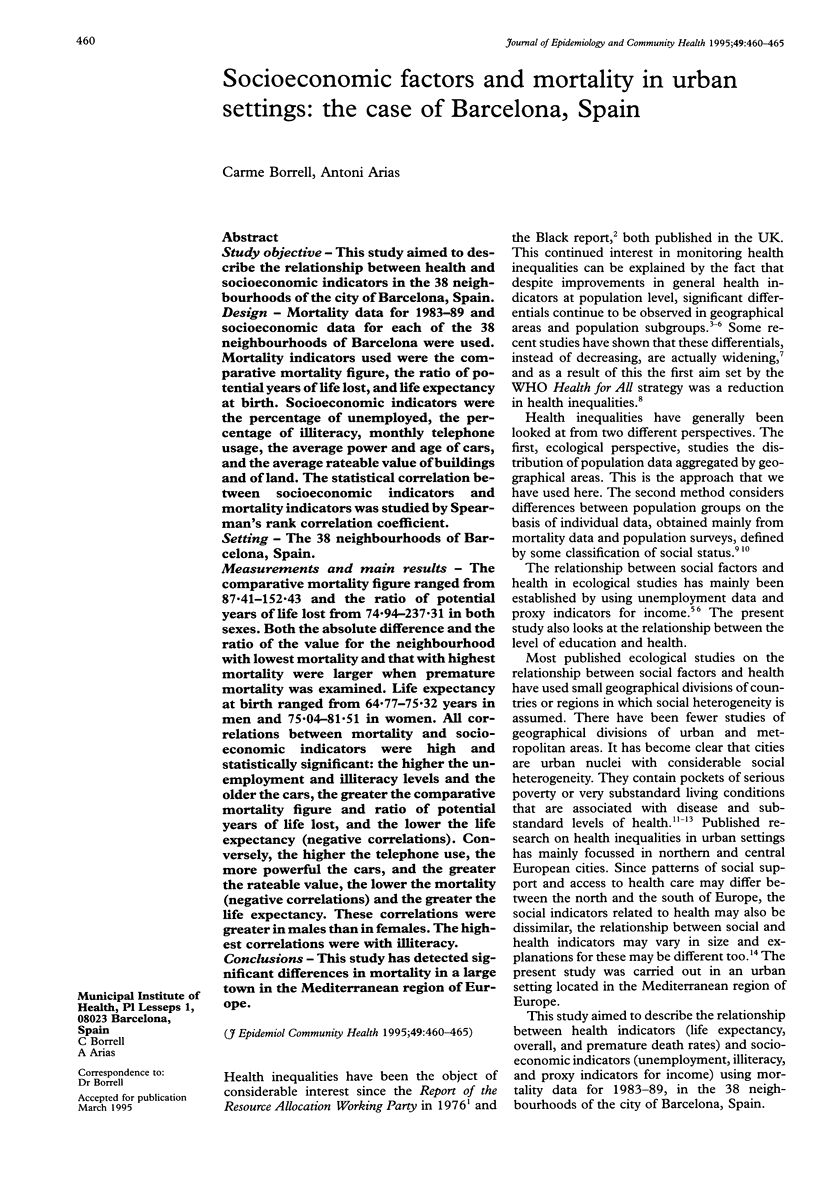
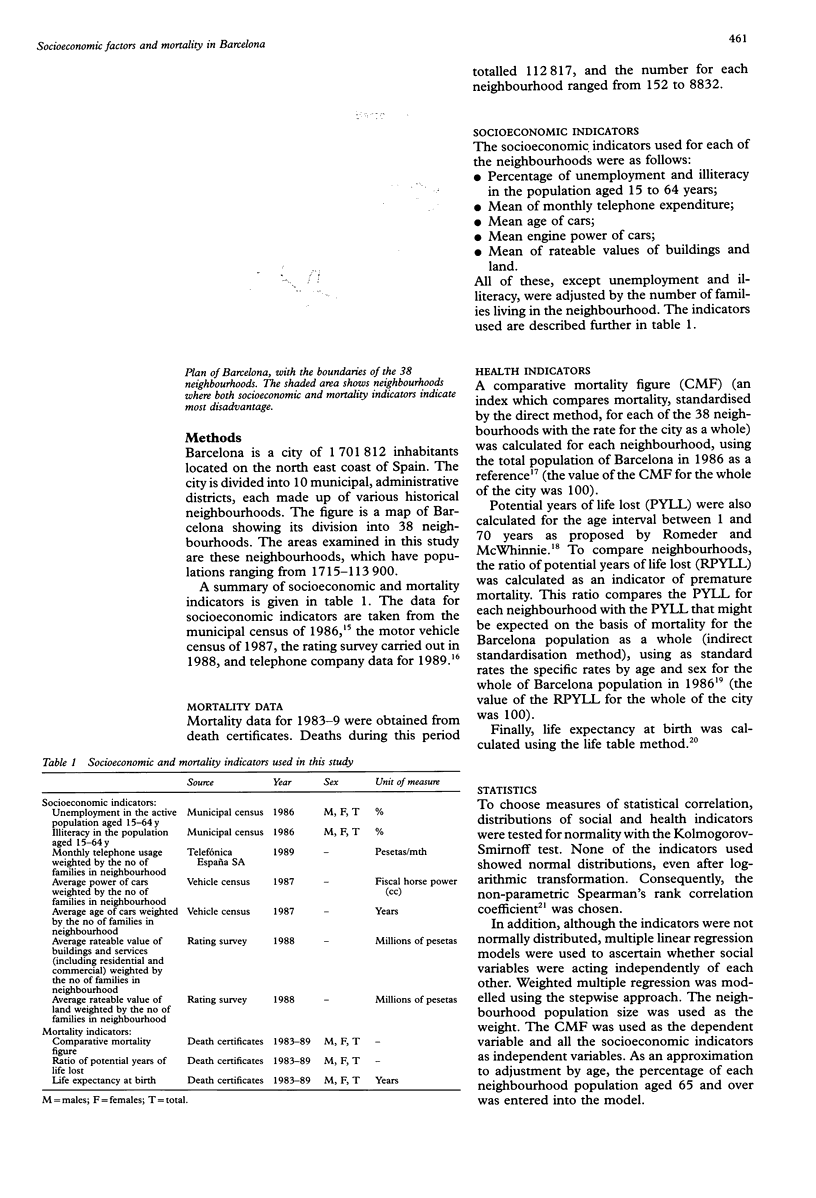
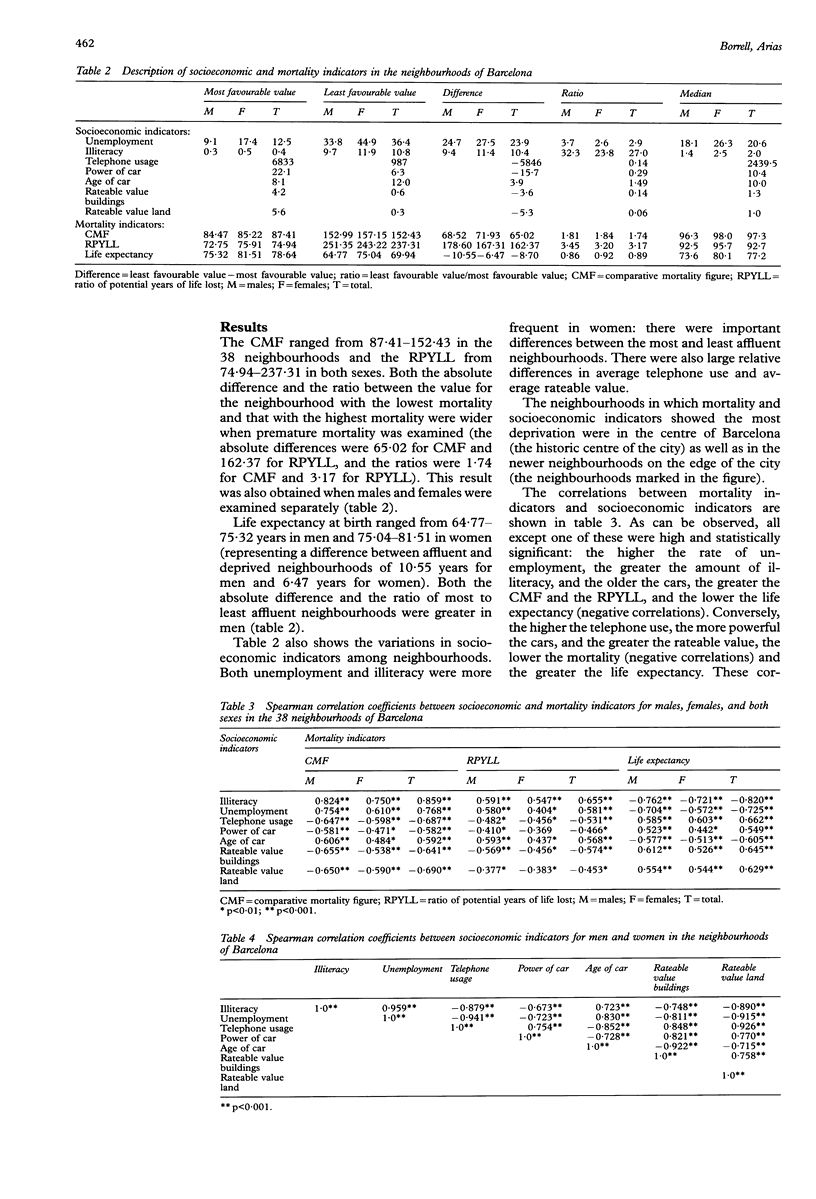
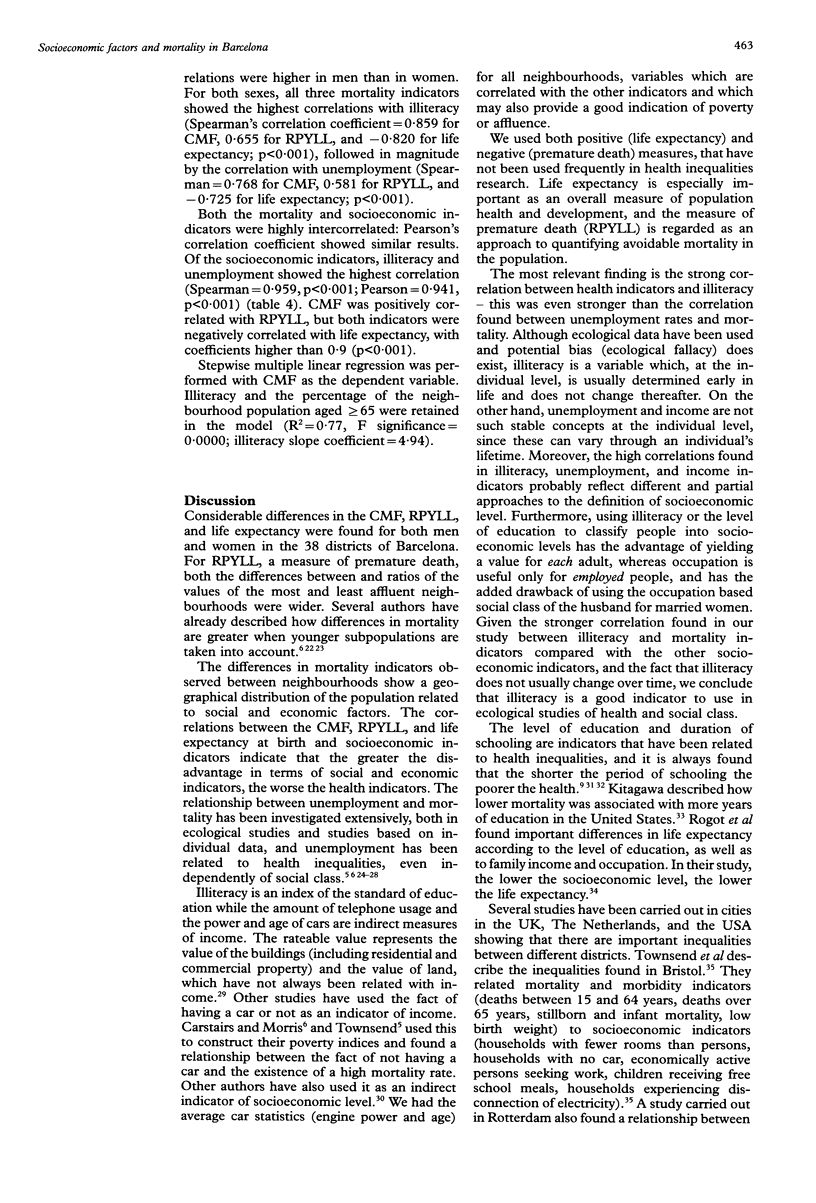
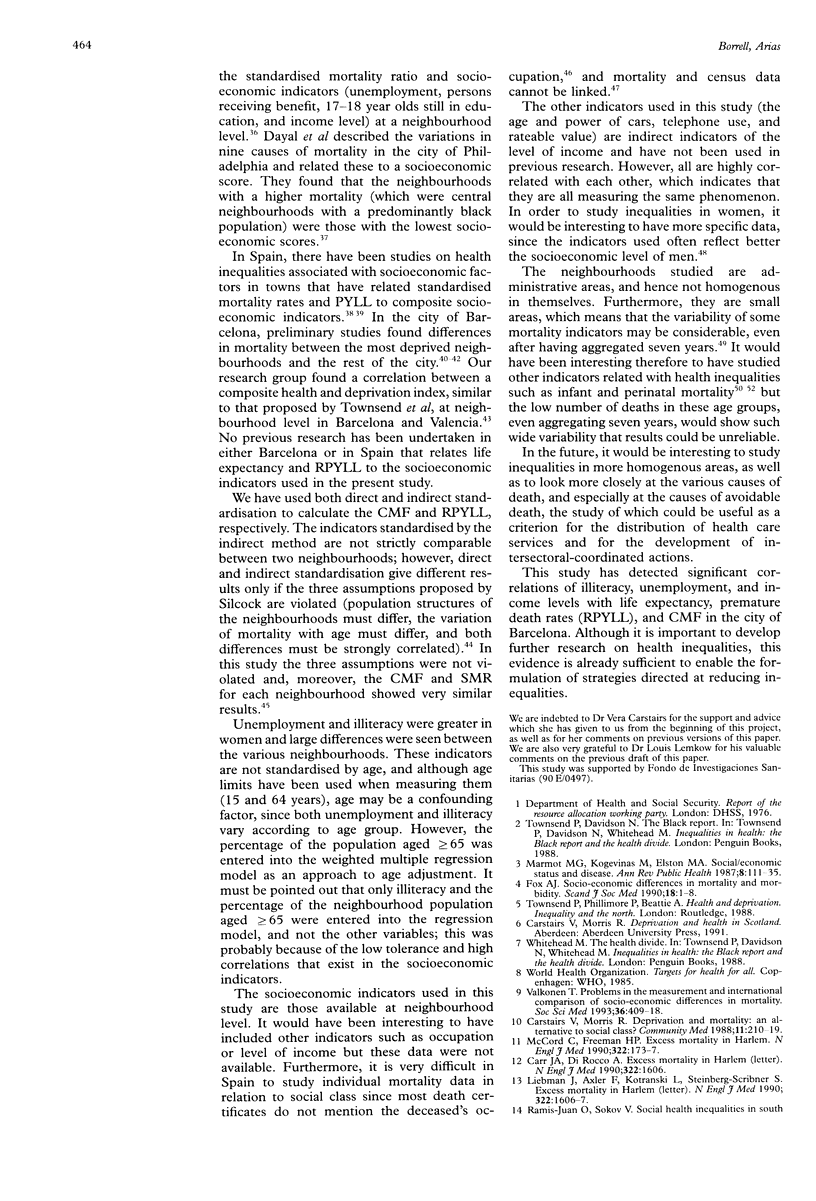
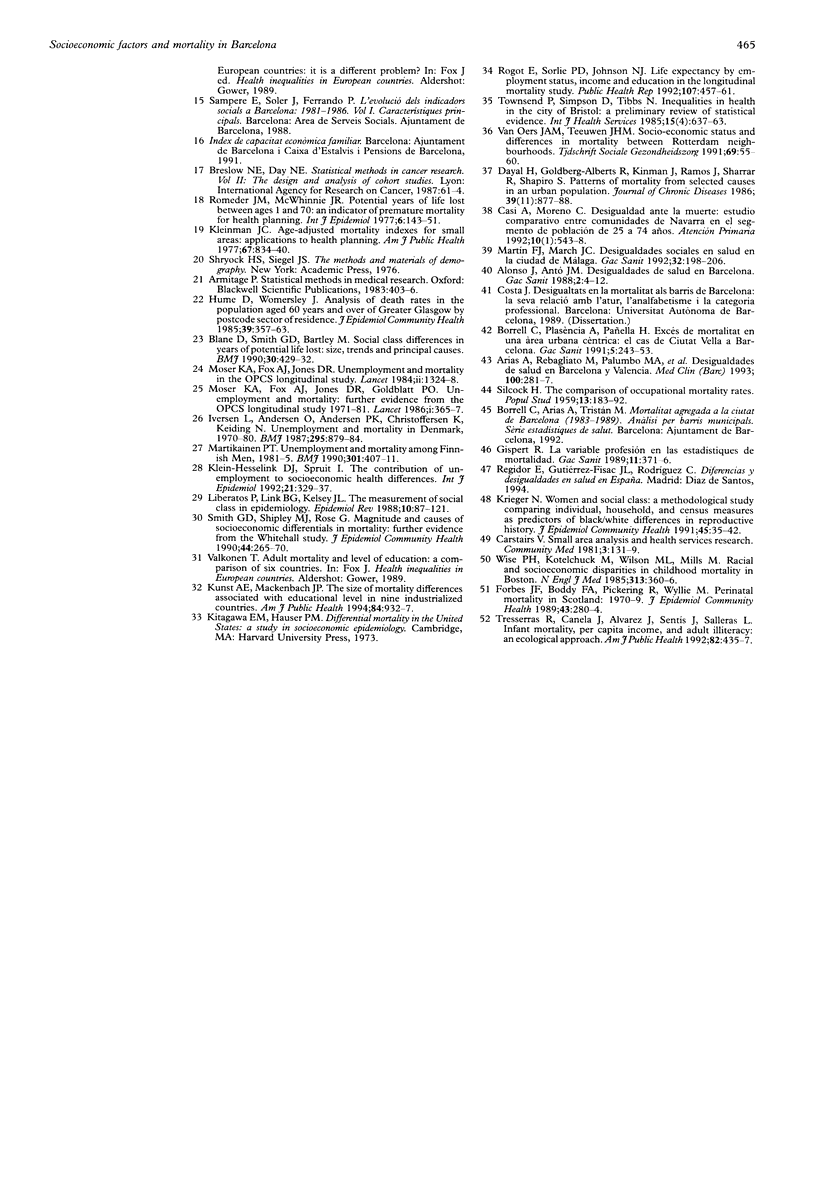
Images in this article
Selected References
These references are in PubMed. This may not be the complete list of references from this article.
- Alonso Caballero J., Antó Boqué J. M. Desigualtats de salut a Barcelona. Gac Sanit. 1988 Jan-Feb;2(4):4–12. doi: 10.1016/s0213-9111(88)70896-1. [DOI] [PubMed] [Google Scholar]
- Arias A., Rebagliato M., Palumbo M. A., Bellver R., Ashton J., Colomer C., Costa J., Flynn P., Alvarez-Dardet C. Desigualdades en salud en Barcelona y Valencia. Med Clin (Barc) 1993 Feb 27;100(8):281–287. [PubMed] [Google Scholar]
- Blane D., Smith G. D., Bartley M. Social class differences in years of potential life lost: size, trends, and principal causes. BMJ. 1990 Sep 1;301(6749):429–432. doi: 10.1136/bmj.301.6749.429. [DOI] [PMC free article] [PubMed] [Google Scholar]
- Borrell i Thió C., Plasència i Taradach A., Pañella i Noguera H. Excés de mortalitat en una àrea urbana cèntrica: el cas de Ciutat Vella a Barcelona. Gac Sanit. 1991 Nov-Dec;5(27):243–253. doi: 10.1016/s0213-9111(91)71076-5. [DOI] [PubMed] [Google Scholar]
- Carstairs V., Morris R. Deprivation and mortality: an alternative to social class? Community Med. 1989 Aug;11(3):210–219. doi: 10.1093/oxfordjournals.pubmed.a042469. [DOI] [PubMed] [Google Scholar]
- Carstairs V. Small area analysis and health service research. Community Med. 1981 May;3(2):131–139. [PubMed] [Google Scholar]
- Casi Casanellas A., Moreno Iribas C. Desigualdad ante la muerte: estudio comparativo entre comunidades de Navarra en el segmento de población de 25 a 74 años. Aten Primaria. 1992 Jun 15;10(1):543-4, 546-8. [PubMed] [Google Scholar]
- Dayal H., Goldberg-Alberts R., Kinman J., Ramos J., Sharrar R., Shapiro S. Patterns of mortality from selected causes in an urban population. J Chronic Dis. 1986;39(11):877–888. doi: 10.1016/0021-9681(86)90036-6. [DOI] [PubMed] [Google Scholar]
- Excess mortality in Harlem. N Engl J Med. 1990 May 31;322(22):1606–1607. doi: 10.1056/NEJM199005313222213. [DOI] [PubMed] [Google Scholar]
- Excess mortality in Harlem. N Engl J Med. 1990 May 31;322(22):1606–1607. doi: 10.1056/NEJM199005313222213. [DOI] [PubMed] [Google Scholar]
- Gispert Magarolas R. G. La variable professió en les estadístiques de mortalitat. Gac Sanit. 1989 Mar-Apr;3(11):371–376. doi: 10.1016/s0213-9111(89)70956-0. [DOI] [PubMed] [Google Scholar]
- Hume D., Womersley J. Analysis of death rates in the population aged 60 years and over of Greater Glasgow by postcode sector of residence. J Epidemiol Community Health. 1985 Dec;39(4):357–363. doi: 10.1136/jech.39.4.357. [DOI] [PMC free article] [PubMed] [Google Scholar]
- Iversen L., Andersen O., Andersen P. K., Christoffersen K., Keiding N. Unemployment and mortality in Denmark, 1970-80. Br Med J (Clin Res Ed) 1987 Oct 10;295(6603):879–884. doi: 10.1136/bmj.295.6603.879. [DOI] [PMC free article] [PubMed] [Google Scholar]
- Klein-Hesselink D. J., Spruit I. P. The contribution of unemployment to socioeconomic health differences. Int J Epidemiol. 1992 Apr;21(2):329–337. doi: 10.1093/ije/21.2.329. [DOI] [PubMed] [Google Scholar]
- Kleinman J. C. Age-adjusted mortality indexes for small areas: applications to health planning. Am J Public Health. 1977 Sep;67(9):834–840. doi: 10.2105/ajph.67.9.834. [DOI] [PMC free article] [PubMed] [Google Scholar]
- Krieger N. Women and social class: a methodological study comparing individual, household, and census measures as predictors of black/white differences in reproductive history. J Epidemiol Community Health. 1991 Mar;45(1):35–42. doi: 10.1136/jech.45.1.35. [DOI] [PMC free article] [PubMed] [Google Scholar]
- Kunst A. E., Mackenbach J. P. The size of mortality differences associated with educational level in nine industrialized countries. Am J Public Health. 1994 Jun;84(6):932–937. doi: 10.2105/ajph.84.6.932. [DOI] [PMC free article] [PubMed] [Google Scholar]
- Liberatos P., Link B. G., Kelsey J. L. The measurement of social class in epidemiology. Epidemiol Rev. 1988;10:87–121. doi: 10.1093/oxfordjournals.epirev.a036030. [DOI] [PubMed] [Google Scholar]
- Marmot M. G., Kogevinas M., Elston M. A. Social/economic status and disease. Annu Rev Public Health. 1987;8:111–135. doi: 10.1146/annurev.pu.08.050187.000551. [DOI] [PubMed] [Google Scholar]
- Martikainen P. T. Unemployment and mortality among Finnish men, 1981-5. BMJ. 1990 Sep 1;301(6749):407–411. doi: 10.1136/bmj.301.6749.407. [DOI] [PMC free article] [PubMed] [Google Scholar]
- Martín Santos F. J., March Cerdá J. C. Desigualdades sociales en salud en la ciudad de Málaga. Gac Sanit. 1992 Sep-Oct;6(32):198–206. doi: 10.1016/s0213-9111(92)71113-3. [DOI] [PubMed] [Google Scholar]
- McCord C., Freeman H. P. Excess mortality in Harlem. N Engl J Med. 1990 Jan 18;322(3):173–177. doi: 10.1056/NEJM199001183220306. [DOI] [PubMed] [Google Scholar]
- Moser K. A., Fox A. J., Jones D. R., Goldblatt P. O. Unemployment and mortality: further evidence from the OPCS Longitudinal Study 1971-81. Lancet. 1986 Feb 15;1(8477):365–367. doi: 10.1016/s0140-6736(86)92326-3. [DOI] [PubMed] [Google Scholar]
- Moser K. A., Fox A. J., Jones D. R. Unemployment and mortality in the OPCS Longitudinal Study. Lancet. 1984 Dec 8;2(8415):1324–1329. doi: 10.1016/s0140-6736(84)90832-8. [DOI] [PubMed] [Google Scholar]
- Rogot E., Sorlie P. D., Johnson N. J. Life expectancy by employment status, income, and education in the National Longitudinal Mortality Study. Public Health Rep. 1992 Jul-Aug;107(4):457–461. [PMC free article] [PubMed] [Google Scholar]
- Romeder J. M., McWhinnie J. R. Potential years of life lost between ages 1 and 70: an indicator of premature mortality for health planning. Int J Epidemiol. 1977 Jun;6(2):143–151. doi: 10.1093/ije/6.2.143. [DOI] [PubMed] [Google Scholar]
- Smith G. D., Shipley M. J., Rose G. Magnitude and causes of socioeconomic differentials in mortality: further evidence from the Whitehall Study. J Epidemiol Community Health. 1990 Dec;44(4):265–270. doi: 10.1136/jech.44.4.265. [DOI] [PMC free article] [PubMed] [Google Scholar]
- Townsend P., Simpson D., Tibbs N. Inequalities in health in the city of Bristol: a preliminary review of statistical evidence. Int J Health Serv. 1985;15(4):637–663. doi: 10.2190/AN09-8R52-UE6B-VWUU. [DOI] [PubMed] [Google Scholar]
- Tresserras R., Canela J., Alvarez J., Sentis J., Salleras L. Infant mortality, per capita income, and adult illiteracy: an ecological approach. Am J Public Health. 1992 Mar;82(3):435–438. doi: 10.2105/ajph.82.3.435. [DOI] [PMC free article] [PubMed] [Google Scholar]
- Valkonen T. Problems in the measurement and international comparisons of socio-economic differences in mortality. Soc Sci Med. 1993 Feb;36(4):409–418. doi: 10.1016/0277-9536(93)90403-q. [DOI] [PubMed] [Google Scholar]
- Vågerö D., Ostberg V. Mortality among children and young persons in Sweden in relation to childhood socioeconomic group. J Epidemiol Community Health. 1989 Sep;43(3):280–284. doi: 10.1136/jech.43.3.280. [DOI] [PMC free article] [PubMed] [Google Scholar]
- Wise P. H., Kotelchuck M., Wilson M. L., Mills M. Racial and socioeconomic disparities in childhood mortality in Boston. N Engl J Med. 1985 Aug 8;313(6):360–366. doi: 10.1056/NEJM198508083130605. [DOI] [PubMed] [Google Scholar]



